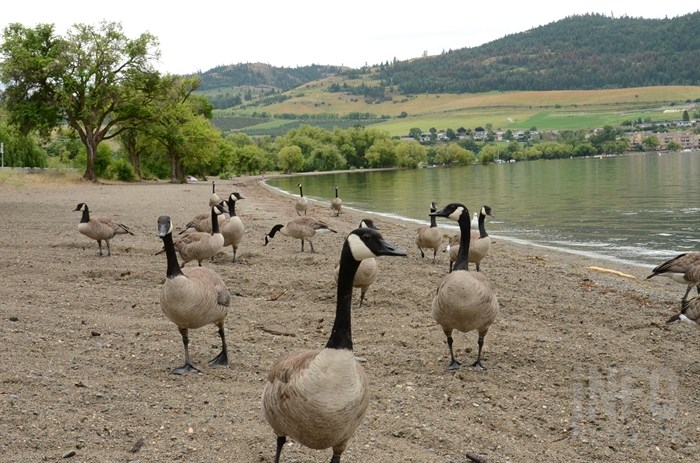
Geese wandering on Kin Beach.
(BEN BULMER / iNFOnews.ca)
July 11, 2019 - 3:36 PM
VERNON - A recent water quality advisory recommending people not swim at Kin Beach has raised questions about the management of the beach often used by far more geese than people.
While it's easy to jump to the conclusion geese poop or a nearby leaky septic system is probably the cause, B.C. Interior Health environmental health team leader Juliana Gola said the water samples taken at Kin Beach were not unusual for the summer months.
"The accounts are above the recreational water guidelines, but they are within the norm that we see during the summertime," Gobi said.
The City of Vernon put out a water quality advisory July 5 saying higher than allowable levels of E. coli had been found in water samples and advised the public not to go swimming.
Gola said if the issue were caused by a leaky septic or sewage system the number of bacteria would be far higher than in any of the samples taken. The reason for the high levels of E. Coli she said was likely to have come from adverse weather conditions where wind and rain, combined with choppy waters stirring-up the bottom of the lake can cause an increase in the bacteria levels.
However, the geese do have to take some of the blame.
"Certain areas of the beach where there is geese or other birds they can definitely affect the water quality as well," she said.
And while geese poop is seen as a plague that affects parks and beaches across the Okanagan, Gobi said you can't lay all the blame on the birds.
Weather patterns, currents, stagnant water getting washed out, as well as the depth and therefore temperature of the water, are all factors that play a part in bacteria levels.
Currently, Interior Health test samples taken in three spots along the beach every week. If a single sample shows a higher than recommended E. coli count, more samples are taken and the result is calculated from a geometric mean of five samples.
Looking at samples taken from June 3 to July 2, seven out of 18 showed high E. coli levels, but due to the number of variables, the results didn't always put the beach in excess of recommended guidelines - and only once was it deemed necessary to put out a water advisory.
And while Kin Beach may have been affected, the nearby beach at Paddlewheel Park, also a favourite goose hangout, received a clean bill of health.
The issue of geese, and more directly their poop, has been widely discussed at Vernon meetings recently and staff are currently looking at more mitigation methods - that could include a cull - and are due to bring a report to council sometime in the new year.
City of Vernon parks planner Kendra Kryszak said several mitigation methods are currently used by the city for goose control.
Goose egg addling, where the eggs are taken and made sterile and then returned, takes place in April and May. From early April to September, scare tactics are used in the form of dogs and bangers that head to the beach at 5 a.m. seven days a week. This also happens at Paddlewheel Park and Marshall Fields. Kryszak said Kin Beach is also cleaned and raked daily in the early hours of the morning.
While the City of Vernon came to an agreement with the Okanagan Indian Band, which owns Sandy Beach stretching south from Tronson Road to the creek, to maintain the entire beach, that agreement expired October 2018.
City of Vernon Mayor Victor Cumming said the OKIB had sent a formal request to the Regional District of North Okanagan asking them to pay for maintenance of the beach. Although the Regional District gave over the control of beaches back to Vernon, Coldstream and the OKIB January 1, 2017, Mayor Cumming said the regional districts still taxes non-band members who live on the OKIB land near Sandy Beach. The request is due to be addressed at the regional district's July 17 meeting.
Looking at Interior Health's water sample results, it appears impossible to draw the conclusion that parts of the beach which are cleaned have lower bacteria counts in the water. The results from each section of the beach fluctuate dramatically regardless of whether they're taken from a part of the beach that is cleaned or not.
So as much as nobody likes the goose poop, it appears the birds can't take all the responsibility when we're advised to stay out of the water.
Water sample details from Interior Health can be found here.
To contact a reporter for this story, email Ben Bulmer or call (250) 309-5230 or email the editor. You can also submit photos, videos or news tips to the newsroom and be entered to win a monthly prize draw.
We welcome your comments and opinions on our stories but play nice. We won't censor or delete comments unless they contain off-topic statements or links, unnecessary vulgarity, false facts, spam or obviously fake profiles. If you have any concerns about what you see in comments, email the editor in the link above.
News from © iNFOnews, 2019